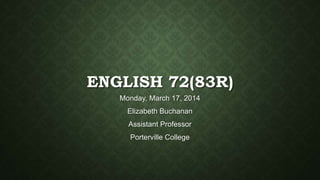
English 72 83 r week 9 day 1 031714
- 1. ENGLISH 72(83R) Monday, March 17, 2014 Elizabeth Buchanan Assistant Professor Porterville College
- 2. AGENDA • Inferences in Reading and Writing • Introduction to Essay #2
- 3. INFERENCES IN READING & WRITING
- 4. INFERENCES • Have you heard the expression… Reading between the lines? • Many important ideas in reading are not stated directly. • Discovering these ideas is called making inferences or drawing conclusions.
- 5. INFERENCES • Involves using what you already know in order to choose the most likely explanation from the facts. • Example: wet floor in your kitchen… • Something has spilled or there is a leak.
- 6. INFERENCES • We all make inferences in daily living without consciously thinking about them. • When you are driving down the street and see police lights flashing behind you, you usually infer that the police officer is pulling you over. • An inference is an educated guess or prediction about something unknown based on available facts or information.
- 7. LET’S CHECK OUT THIS VIDEO • http://www.youtube.com/watch?v=ZiCMG4-j2iY • While the young man is speaking, think about who he is talking to. • What is he trying to explain to the other person? • How does he feel about what he has done?
- 8. WHAT IS GOING ON? (VIDEO) • Who is the young man talking to? • How does he feel? • How does the other person feel? • Why is he sorry? • What does he want the other person to say? • What does the other person say?
- 9. LET’S LOOK A THE VIDEO AGAIN, EXCEPT THIS TIME WE WILL INCLUDE THE GIRLFRIEND. • http://www.youtube.com/watch?v=Xt1IWCPk2oo • Think about her side of the conversation. • Does she understand what her boyfriend has done? • Does she think he is truly sorry?
- 10. INFERENCES • He is talking to his girlfriend • He is nervous about being confronted by her • He apologizes and wants to explain why he was unfaithful. • She won’t listen to him. • Do you think she forgives him?
- 11. INFERENCES • In the first video we had to try to infer what the young man was talking about without being able to hear/see what the other person was saying/thinking. • In writing we make inferences and draw conclusions, by using all the clues provided by the writer, our own experience, and logic.
- 12. KEEP IN MIND Draw conclusions and inferences based on what is stated. Not your own opinion or attitude Check back in the text to verify or locate information that supports your conclusions. Ask yourself if your inference is logical and reasonable.
- 13. LET’S PRACTICE WITH A MURDER MYSTERY
- 14. INTRODUCTION TO ESSAY #2
- 15. ESSAY 2: “EDUCATION: BOUNDARIES, BORDERS, AND BRIDGES.” • The Porterville College Cultural and Historical Awareness Program (CHAP) was organized in 2002 to enhance students' awareness of certain important aspects of our society to which they may previously have had little or no exposure. • This year the theme is “Education: Boundaries, Borders, and Bridges.”
- 16. • For your second essay you will choose an educational theme to write about. • You will also adopt one of the following Patterns of Organization to integrate into your essay. • Cause and Effect • Comparison and Contrast • Chronological/Time Order • Example and Definition
- 17. • This essay will be very different from the “This I Believe” essay. • First of all, it is not a personal statement. • Second, you will be doing research. • Thirdly, it will be a minimum of three (3) pages, and will also have a Works Cited page.
- 18. FIND AND RECORD APPROPRIATE SOURCES • Let’s discuss strategies for finding appropriate information. • Consult a librarian. • Use a systematic approach; start with general sources, then move to more specific ones. • Use current sources. For many topics, up-to-date information is the most relevant or useful. You do not want to use ideas that are outdated.
- 19. • Use sources that have a different viewpoint. • Preview articles by reading abstracts and summaries • Read sources selectively. • Skim the material to locate information relevant to your subject.
- 20. • Choose sources that are trustworthy and reliable. • Look for sources that lead to other sources. • Keep an accurate record of sources to avoid plagiarism.
- 21. SOURCES • Which of the following is the best source to use in writing a research paper? • Simply “Google” it. • Go to on line to Wikipedia • Go to the library and search for books on the topic you are interested in. • Go to the library database to search for articles. • All of the above • None of the above
- 22. SOURCES • Absolutely do not “Google” or go to “Wikipedia.” • You must use library resources only. • This includes books and the library’s database.
- 23. LET’S PRACTICE • Turn on your computer. • From the Porterville website • Scroll down on the left side of the page until you find “Library” • Click on “Search Databases” • Go to the Ebscohost Database (need password info here)
- 24. LET’S PRACTICE • Pick one of the following topics to research: • Privacy on social media sites • The history of trade unions • The spread, control, or treatment of “bird flu” • The Great Depression of the 1930’s • Legalized gambling (or lotteries)
- 25. PICK THREE TOPICS • You have one week to review the Education topics, and submit your top three choices. • For each topic, only two students can report on it. Also if you and another student are given the same topic, you will each need to approach it from a different Pattern of Organization.
- 26. ASSIGNMENTS FOR WEDNESDAY •Literature Circle 5 •Inferences Activity
